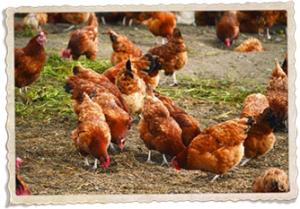When you crack open an egg, the first thing you notice is the yolk. But have you ever wondered why some egg yolks are light yellow and others a deep orange? Some people believe it has to do with the breed of the chicken, others with the nutrients in their diet. However, both are wrong. Below, we dive deep into the coloring of egg yolk to help answer your questions:
What causes the color of egg yolks?
The shade of your egg yolks has nothing to do with a chicken’s breed nor the nutrients in the yolk itself. It has to do with the pigments in the food your chickens eat.
If a hen eats food with plenty of yellow-orange pigments (called xanthophylls), then those pigments will create a darker orange yolk.
Hens that eat yellow corn or alfalfa meal will lay medium-yellow yolks.
Finally, hens who eat wheat or barley will lay light-yellow yolks.
Do different colors have different nutrients?
Frankly put, no. An orange egg yolk will have the same nutritional value as a yellow egg yolk. Again, it only has to do with the pigment of the food, not the food itself that your chickens eat.
No matter their color, though, egg yolks are great sources for nutrients.
Many people praise egg whites for their low-caloric intake and fat-free protein. In fact, some people even remove the egg yolks and only stick to egg whites. But in reality, most of the nutrients found in eggs come from the yolks. Egg yolks contain vitamins like A, K, D, and E, as well as essential fatty acids like DHA, ALA, and EPA omega-3s. Other nutrients that can be found in yolks include calcium, iron, magnesium, phosphorous, zinc, choline, carotenoids, and B vitamins.
All of this means that egg yolks are certainly nutritious no matter their color. That’s why dietitians recommend you eat the whole egg, not just the egg whites.
Of course, if you prefer the taste of egg whites, there’s no harm in leaving out the yolks. But you won’t be getting much nutritional benefit by doing so.
For more information on chicken eggs, raising a backyard flock, and everything else that has to do with chickens, read through our blog or contact Chickens for Backyards today!

